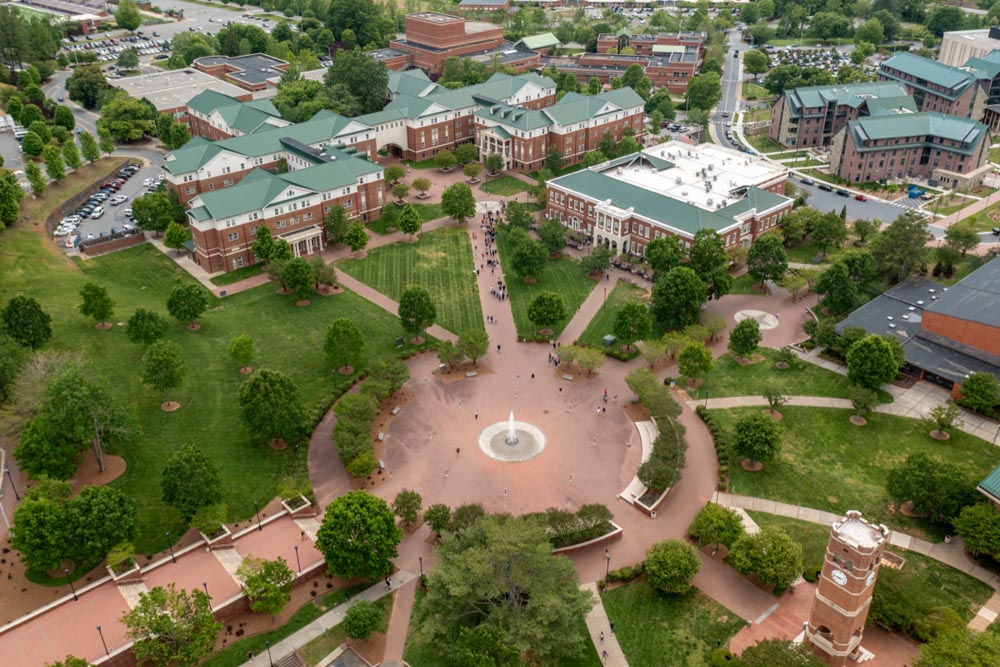Seeking Synergies
With the support of industry partners from across Western North Carolina, Western Carolina University is expanding its engineering programs to help meet the needs of a region that is experiencing unprecedented growth in engineering, manufacturing and research-focused businesses and industries.
The university identified expansion of its engineering programs as WCU’s top legislative priority, an effort backed by the University of North Carolina System. WCU received authorization for $95.3 million in project funds for a new home for engineering as part of the 2023-24 state budget, along with $2 million in advance planning funding. Advocacy efforts by Chancellor Kelli R. Brown and the WCU Board of Trustees helped raise awareness among key state officials about WCU’s engineering college and its critical impact for regional industry needs.
The advance planning money and authorization to proceed are necessary first steps for a new facility, currently planned to be located near the Apodaca Science Building, for a new home for engineering and technology programs currently in the existing 1960s-era Belk Building.
WCU also sought and received $3.5 million in recurring funds as part of the state budget to grow additional instructional and professional support staff to develop and deliver expanded programming.
“To provide the engineering education that our students deserve and to meet desperate industry needs, the college needs a new building commensurate with the 21st-century workplace, the engineering profession and the technology innovation ecosystem,” said college dean Randy Collins.
The college recently obtained a grant of $478, 803 from the N.C. Golden Leaf Foundation to establish an automation and robotics laboratory and a $400,000 grant from Dogwood Health Trust, conditional on WCU receiving matching funds in the appropriations bill, for advanced planning of a new engineering building.
Over the years, the college has received in-kind gifts of equipment for its construction management program from donors including America’s Home Place, as well as funding for student safety training from Wayne Brothers Inc. and financial support for scholarships from the N.C. Chapter of the Construction Management Association and from James R. Vannoy and Sons Construction Co.
Industry partners also offer employment opportunities for WCU graduates and internships and other experiential learning opportunities for current students. For example, more than half of Vannoy’s college-degreed positions in the region are filled by WCU alumni, and the company hires an average of eight interns during the summer, said Brian Walker, company vice president.
“It is important for those of us in Western North Carolina to have a top-notch engineering school option for our community. This is not only important for teaching and training, but it also provides us with an education and research partner in our industry with whom we can work together on the latest trends and technologies,” Walker said.
The college is teaming up with industry partners including premium sponsors Duke Energy and Eaton Corp. to host the 55th Annual North American Power Symposium this fall in Western North Carolina. It will bring together more than 200 undergraduate and graduate students, faculty and industry professionals from across the U.S. to WCU to focus on technological and business advances in the electric power and energy sector. Also providing sponsorship support for the conference are the National Science Foundation and Institute of Electrical and Electronics Engineers and industry partners Aegis Power and TRC.
Duke Energy is co-sponsoring the symposium as part of its commitment to an ambitious transition to clean energy, said Lisa Leatherman, government and community relations manager.
“It is critical that companies like Duke support WCU’s engineering initiatives to build the next generation of energy innovators,” Leatherman said. “In addition to our North American Power Symposium sponsorship, Duke Energy awards underrepresented students with scholarships to WCU annually. This support helps bring the bright and diverse minds we need to the table as we undergo our clean energy transition.”
The support from external industries through financial contributions, sponsorships and in-kind gifts of equipment and software is critical to help the College of Engineering and Technology continue to adapt to stay at the leading edge in a fast-changing environment, Collins said.
“The synergies created by the needs of our state and region’s business and industry, the economic growth and vitality of the region and the demand for highly skilled engineering talent fuel the plans for transforming engineering and technology at WCU,” Collins said. “Through these synergies, we have an amazing future ahead of us.”

